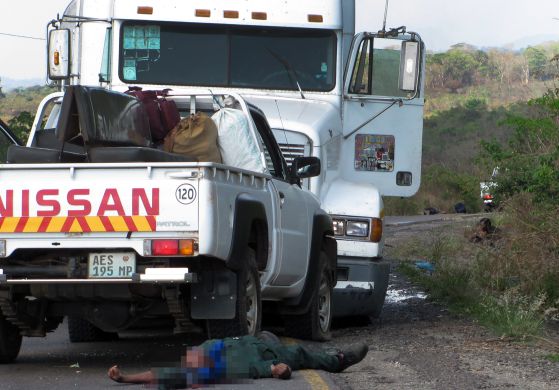Ministry re-verifies pension payroll to eradicate ghost combatants
Truck drivers call N1 Save-Muxungué section “death row” – Mozambique

Lusa
After a series of ambushes and the imposition of mandatory military escorts, truck drivers and passenger transport operators have taken to calling the Save-Muxungué section of Mozambique’s principal highway “death row”.
“It’s like being moved to death row. You enter the section already sentenced to death and, if you come out alive, it feels like you’ve been reprieved,” truck driver Sergio Cristovo tells Lusa as he waits for his column to embark on the hundred-kilometre stretch of road in Sofala province.
Christovao recalls the civil war of more than two decades ago, when the escorts ran between Save and Inchope in Manica province, but “the risk was the same as today”, arguably even more serious given the more sophisticated and deadly weapons at the disposal of the warring parties.
As the column forms up, fear and uncertainty grip passengers, some making the journey for the first time since escorts were imposed in February after a series of ambushes attributed by the police to Renamo, others forced by the circumstances to repeat the ordeal.
“I am very scared, but I had to buy the ticket and travel from Chimoio to Maputo by bus to attend to family problems,” Fina Joaquim tells Lusa, calling on the warring parties not to attack innocent people.
Telvina Suzana, heading back to Gaza with six children in her car, said she has no option but to make the journey a second time despite an earlier column in which she travelled being strafed by men the police say are Renamo opposition members.
The situation in the Save-Muxungué section recalls the Renamo attacks on Defence and Security Forces escorts in the 2013-14 pre-election period.
For almost a month, military escort of civilian vehicles has been mandatory on the Save-Muxungué and Nhamapadza-Caia sections of the N1 in Sofala province, causing a fall in demand for seats on buses.
“Now there are buses leaving with 20 passengers on a 60-seater bus, and the tickets barely pay for the fuel. Normally, buses would leave twice a day for Maputo but now only one does and only by a miracle would it be full,” an inspector at the bus terminal in Chimoio tells Lusa.
With ambushes and escorts making life difficult for carriers and passengers, dozens of entrepreneurial women are making the best of the situation and have set up canteens at the ends of escorted sections to serve meals to travellers.
“It’s a business opportunity. People travelling want to eat while waiting for escorts. Sometimes, they even end up sleeping here,” explains Maria Conceição as she wraps fish and chip sandwiches in napkins.












Leave a Reply
Be the First to Comment!
You must be logged in to post a comment.
You must be logged in to post a comment.